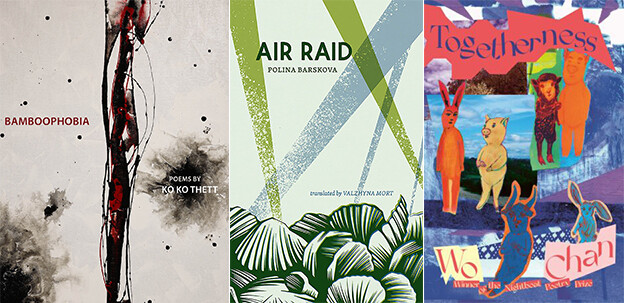
Worldly belongings
Orchid Tierney

Reviews editor Orchid Tierney returns with capsule reviews of Bamboophobia by Ko Ko Thett, Air Raid by Polina Barskova, and Togetherness by Wo Chan.
Bamboophobia, Ko Ko Thett (Zephyr Press, 2022)
A collection of new and selected poetry, Bamboophobia coalesces Ko Ko Thett’s sensual, playful, and scalding grip on language to pierce the reverberating humanitarian crisis in Myanmar. “The edge of language,” Ko Ko Thett writes, “is the edge of the adhesive seal of an / envelop you lick to en-coffin the corpse of a poem you wish you / had never written.” The collection includes thirteen poems Ko Ko Thett had written and translated himself from the Burmese, but arguably this is entirely a work of translation. The poet compellingly demonstrates the fuzziness of language to convey its atmospheric social and political nuances: “Come morning, we say, ‘Have you eaten?’ to / celebrate the day, for we are still here.”
Air Raid, Polina Barskova, trans. Valzhyna Mort (Ugly Duckling Press, 2021)
Air Raid draws onto its pages the siege of Leningrad and the cracking of human tragedies. In her commentary, translator Valzhyna Mort writes that “the translation of poetry becomes a moral habit. We translate because we refuse to forget.” Polina Barskova’s poetry captures this refusal to forget the sharpness of suffering and the painful ordeal of war’s relentless rhythms. “People phoned each other,” she writes ‘How’s your health?’ / One was ‘unwell,’ the other ‘hospitalized.’ / Everybody knew what that meant.” At once empathetic and insistent, Air Raid underscores not only the searing terror of life under siege but also translation as a site of careful attention: “An eye opens the surface, a finger rips through a poem / the walls of the vessel collapse under the pressure of Word.”
Togetherness, Wo Chan (Nightboat Books, 2022)
Wo Chan’s remarkable debut collection puts in tension memories of the diaspora as the poems move between childhood, the family restaurant, and a racist immigration system that demands exceptionality and authenticity. Articulating the multiplicities of experiences and affect in conflict, Togetherness invokes a lyrical address to love, community, and belonging. Lines, such as “My mother was a fever. My father was a restaurant. / Every noon he fed his lungs to an entire city” and “some family trees. / some live, some unexpectedly live, / and some sudden blowout—chrysanthemums / choke you still in the throat—into spring” display the poet’s beautiful intervention into the lyrical form.